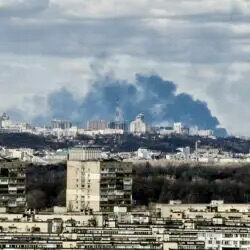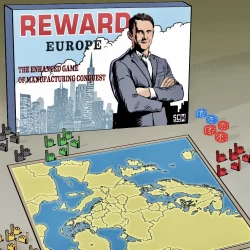War in Ukraine could accelerate supply chain sustainability

The war in Ukraine has added to the supply chain uncertainty. The conflict is having a major impact on freight flows worldwide, forcing businesses to reroute their deliveries. VDL Nedcar is just one example of a company struggling to obtain parts. In the long term, experts expect this conflict to accelerate the reshoring trend and the transition to green energy, which is being further bolstered by the current unity in Europe.
By Harm Beerens
The geopolitical tensions resulting from Russia’s invasion of Ukraine are causing numerous headaches for supply chain professionals around the world. They face a range of urgent problems that need solving, from a sudden lack of Ukrainian drivers and disruption to container transport by rail from China to Europe, to the closure of Black Sea ports. Besides that, economic sanctions have been imposed on Russian banks and other companies. For VDL Nedcar, the inability of a supplier with factories in Ukraine to deliver wiring harnesses temporarily brought production to a standstill.
Caroz, a 4PL company that monitors and manages transport flows worldwide, has warned its customers to expect rising fuel prices, cyberattacks and restrictions on air transport. “Containers are stuck in all kinds of places around the world and we’re continuously searching for alternatives so that customers can get their goods to their destinations,” says Mike Heijnen, Director of Operations. “It’s all hands on deck for us at the moment and we’re trying to be as creative as possible in order to help our customers.”
Rerouting goods flows
According to Patrick Haex from Buck Consultants, many of the enquiries are about the rerouting of goods flows to Russia. “If customers currently have goods in transit to Russia, they want to reroute them or arrange storage in Western Europe or Finland. After all, once the products are in Russia, it’s difficult to extract them for sale elsewhere. Additionally, a growing number of service providers, such as DHL and Kuehne + Nagel, are no longer accepting bookings for shipments to Russia.”
Haex explains that a lot depends on the incoterms that companies have agreed: who is responsible for which step of the transportation – the buyer or the seller? And is the seller actually still willing to export the goods to Russia? Currency agreements are also very relevant at the moment: “The sanctions have caused a rapid and dramatic drop in the value of the rouble, so if you’re paying in dollars but invoicing in roubles, it’s unlikely that the transactions will still be profitable.”
Reshoring trend will gather pace
In the slightly longer term, Haex predicts that the conflict will lead to more reshoring among European businesses, who will decide to bring their production activities back from Asia to manufacture closer to the sales markets. “Companies want to reduce their supply chain vulnerability. This trend started during the coronavirus pandemic, but I expect the geopolitical tensions due to the Ukraine situation to further heighten the urgency. With fuel prices – and hence transportation costs – skyrocketing, the ‘make in region, sell in region’ principle will become even more attractive.”
Transition to non-fossil fuels
According to Gerard Ekhart, a trendwatcher and ‘business doctor’ in the manufacturing industry, this may be one of the few positive outcomes of the tragic and horrifying conflict. He is a long-standing proponent of moving away from carbon-emitting and planet-depleting supply chains. “I think this war will magnify the current energy crisis and accelerate the transition. This shockwave may push those companies that are still hauling goods from one side of the world to the other to finally make the transition to non-fossil fuels. The necessary technology has been around for a long time, but senior executives have dragged their feet. This will soon change if the price of oil continues to rise and Europe wants to reduce its dependence on Russian gas.”
A united Europe
One small ray of hope in the current crisis, he says, is the strong sense of unity that currently exists within the European Union. “This is necessary for an energy transition, because countries can’t do it alone. And just as we are now suddenly working very closely together in Europe on defence, we must do the same in terms of our manufacturing policy and building sustainable supply chains. In fact, automotive is the only industry that’s still relatively autonomous in Europe; we’ve dismantled all other industries here and largely relocated them to other parts of the world. We will have to rebuild them here, but this time based on clean technology – and supply chain professionals need to take the lead in this.”
Above all, the terrible war in Europe is the source of unimaginable suffering, and the citizens of Ukraine – who are fighting for their lives and their freedom – are in the hearts and minds of people all over the world. Compared to that, the challenges facing the supply chain community pale into insignificance. Nevertheless, the problems posed to international shipments by rising fuel prices, disruption and closure of supply routes, cyberattacks and driver shortages will prompt European businesses to reduce their supply chain vulnerability by reshoring their production activities. Let’s hope that they can simultaneously manage to make the much-needed transition to supply chain sustainability.










